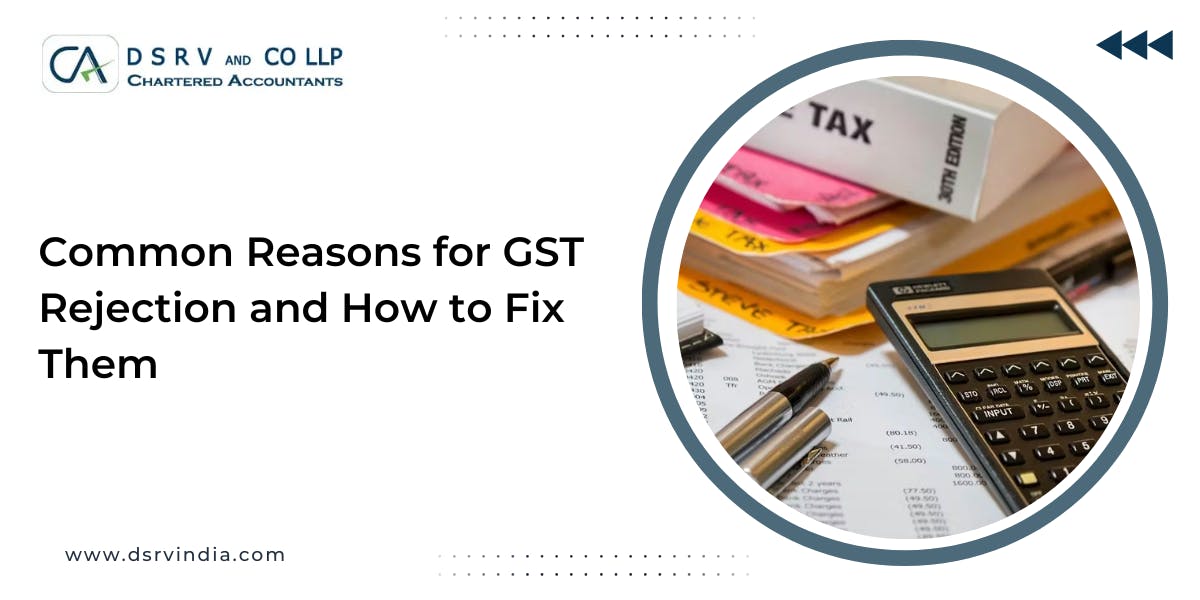Common Reasons for GST Rejection and How to Fix Them
Facing GST rejection? Know the top causes and solutions for GST registration, refund denial, ITC mismatch, and notices. Avoid rejections in 2026.
Facing GST rejection? Know the top causes and solutions for GST registration, refund denial, ITC mismatch, and notices. Avoid rejections in 2026.

Getting started with GST or managing ongoing GST compliance should ideally be smooth. But in reality, many businesses face one common headache: rejections.
It could be:
Whatever the case, a rejection from the GST side slows down your business, blocks cash flow, and adds stress you don’t need.
The good news?
Most GST rejections happen for predictable, avoidable reasons. Once you know what to watch out for and how to correct it you can reduce your risk dramatically. If you’re finding the process difficult, consulting a GST consultant in Gurgaon can help ensure proper documentation, compliance, and smooth communication with the department.
In this blog, let’s walk through:
Most GST rejections happen for predictable, avoidable reasons. Before applying, ensure you have all the mandatory documents required for GST registration and understand the common problems and solutions in GST registration.
One of the most frequent problems is rejection of GST registration applications.
Sometimes, applications are also rejected because the department feels:

With tighter checks and Aadhaar-based authentication, many applications face trouble at the KYC level.
If the GST system flags authentication failure, resolve the Aadhaar issue first, then try again.
Read This: GST on Intercompany Transactions & Related Party Transfer Price
In recent years, GST authorities have become stricter to prevent fake registrations and bogus ITC claims. If the officer raises doubts about business genuineness, the case may move into GST adjudication, where your documentation and explanation become critical
If your registration is rejected on grounds of non genuine business, it’s important to address the exact objections and reapply with stronger proof.

Many businesses especially exporters and those under inverted duty structure face refund rejection or long delays.
If you receive a rejection order, go through it carefully. In some cases, you can rectify the issues and reapply, or consider appeal, depending on the reason. In cases where refund rejections are not fixable through reapplication, you may need to file an appeal against a demand order in GST.

You may not always receive a “rejection order,” but your Input Tax Credit (ITC) can get blocked or questioned due to mismatches.
Good vendor management and monthly reconciliation can prevent most ITC-related GST issues. If ITC is blocked, you may receive a Show Cause Notice. Here are the top things you must know about GST SCN clarifications.
Sometimes, it’s not the registration or refund, but your returns that cause trouble.
All of these can lead to:
If the department sends a notice for mismatch, reply with a clear reconciliation and proof of genuine transactions.

Non-filing or persistently late filing of GST returns can create multiple problems:
Going forward, set up reminders, use automation tools, or involve a professional to ensure returns are filed on or before the due date.
Many GST “rejections” are not because the department is harsh but because taxpayers don’t respond properly.
This can result in:
A calm, fact-based response, supported by documents, often resolves issues at the initial stage itself.

Here are some simple habits that can dramatically reduce your risk:
Maintaining proper compliance also helps during audits. Here’s how to handle a GST audit under Section 65 of the CGST Act
If you are repeatedly facing:
…it’s wise to talk to a GST expert or CA.
They can:
Most GST rejections whether in registration, refunds, ITC, or returns come down to three things:
The system is becoming more automated and data driven every year, which means small mistakes stand out quickly. The positive side is: if you keep your records clean and respond properly, the process also becomes more predictable and fair.
You don’t have to handle GST issues alone.
At DSRV India, we help businesses understand why their GST registration in gurgoan, refund, or ITC was rejected and what exactly needs to be done to fix it. From documentation checks to replying to notices and planning better compliance, our team supports you at every step.
Reach out to us, and let’s review your case together so you can get back to focusing on your business, not just your tax portal.
Understand tax penalty proceedings. Learn about assessment under the Income Tax Act, when a penalty can be imposed, and initiation of proceedings.
Understand faceless assessments & appeals under Income Tax Act. Guide to the scheme, taxpayer rights, and handling notices.
GST Limitation Period ends March 31! Close notices & appeals under CGST Act Section 73 & 74. Know the time limit for GST demands, avoid penalties.
